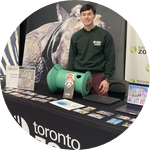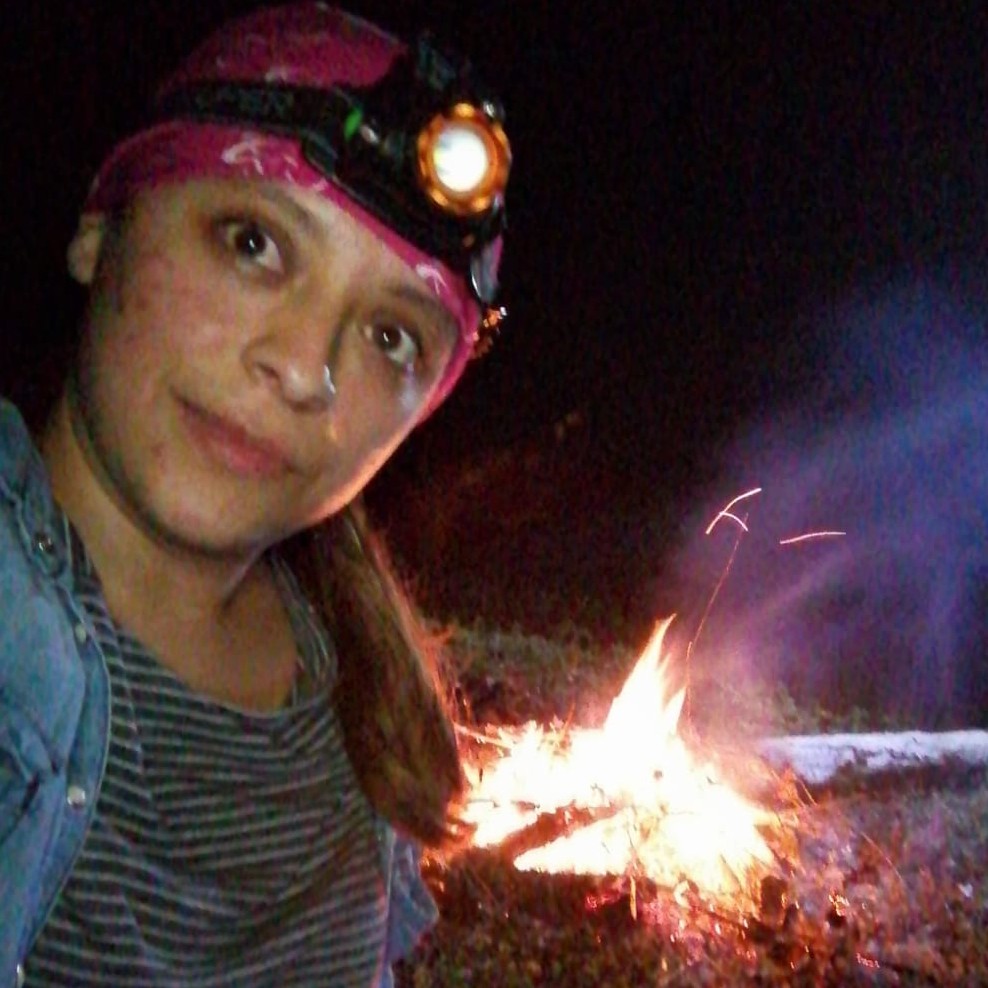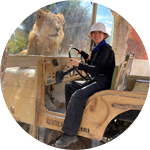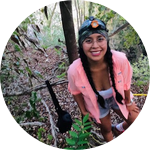About This Project
Disturbance in Mexico is concentrated in the southeast region, where 10,000 km2 of tropical forests were lost between 2001 and 2010.
This represents a constant challenge for wildlife, putting their health and conservation at risk. It can also affect host and pathogen dynamics, increasing outbreaks caused by zoonotic agents.
Our objective is to determine the degree of habitat transformation and its impact on the health of wild bats and rodents in tropical forests of Campeche, Mexico.
Ask the Scientists
Join The DiscussionWhat is the context of this research?
Research has been conducted on the impact of habitat transformation on mammalian physiology; where 87.5% showed negative effects. These effects range from physiological and metabolic dysfunctions, immune suppression and predisposition to infectious diseases.
Differences in virus richness and prevalence have also been observed: the prevalence of paramyxoviruses in bats was 15.7% at sites with a high degree of disturbance, being significantly higher than at sites with a moderate degree of disturbance (5.6%).
Understanding the effects of anthropogenic disturbance on wildlife health is challenging due to the limited physiological information available for each species. In this case, the use of indices such as allostatic load can be effective as a clinical tool in wildlife; such an index assesses biomarkers related to physiological, metabolic, and immune disorders. However, much data are still needed to develop these indices.
What is the significance of this project?
The conservation of bats and rodents is important because they fulfill ecological functions such as pest control, seed dispersal, and nutrient and energy transfer. It has also been observed that they respond physiologically and behaviorally to habitat transformation, making them great allies in understanding the impact of human activities on ecosystems and wildlife health.
It should be taken into account that the success of conservation programs depends in part on knowledge about the state of the habitat, knowledge about physiological and behavioral changes and knowledge about the epidemiological profile of the species; therefore, it is also important to identify species vulnerable to infectious diseases and pathogens that can put biodiversity and public health at risk.
What are the goals of the project?
Sampling was carried out in the tropical forests of Campeche, Mexico, where bats and rodents were captured using mist nets and Sherman traps, respectively; saliva, hair and organ samples were obtained, as well as morphometric measurements and weight. Subsequently, saliva and hair samples were analyzed at the Toronto Zoo Endocrinology laboratory to determine acute and chronic stress; these indicators, weight and body condition were integrated into an allostatic load index. For landscape analysis, forest cover was measured at two different spatial and temporal scales using the Normalized Vegetation Index (NDVI) in the Arcgis Pro geoprocessing tool. Finally, for paramyxovirus diagnosis, organ samples will be processed in the research laboratory where RNA extraction, RT-PCR and sequencing will be performed.
Budget
Currently the project costs are partially covered and through this funding we seek to cover the remaining costs corresponding to the landscape analysis and paramyxovirus diagnosis. This budget covers the processing of 127 bat samples and 101 rodent samples; as well as the analysis of the 14 sampling sites.
Endorsed by
 Project Timeline
Project Timeline
So far we have completed two important milestones: sampling which took almost two years (2021-2023) as sampling was needed in different seasons. And the measurement of acute and chronic stress which took one year (2024) which included laboratory training and standardization of tests.
We are now in the final phase which consists of completing the landscape analysis, paramyxovirus diagnosis and publication of results for which we have allocated 6 months (May - October 2025).
Jan 30, 2024
Measurement of biomarkers (stress, weight and body condition)
Jan 30, 2025
Landscape analysis
Mar 10, 2025
Project Launched
Aug 30, 2025
Paramyxovirus diagnostics
Dec 01, 2025
Analysis and publication of results
Meet the Team
Affiliates
Affiliates
Affiliates
Diana Blanquet Ramírez Gutiérrez
Veterinarian graduated from the Universidad Nacional Autónoma de México.
Since I was very young I had the opportunity to perform outdoor activities which fostered my curiosity for nature and animals since then.
During my professional development I showed interest in the study of wildlife and infectious diseases, which led me to complete a Diploma in Veterinary Public Health and participate in eco-epidemiological and conservation projects in wildlife.
I am currently pursuing a Master of Science degree and through my project I sought to contribute to the understanding of zoonotic diseases and species conservation from a one health approach, as well as to develop my skills as a future researcher.
Cindy Karime Meza González
I am a thesis student at UNAM's Faculty of Veterinary Medicine and Zootechnics. Since I was a child, I have been interested in the life of animals, which is one of the reasons I chose this career. I love domestic and wild cats, and one of my areas of interest is species conservation. I am currently working on my undergraduate thesis with a One Health approach, focusing on the conservation of small wild felines in Morelos, Mexico, and dogs as bridge hosts for infectious agents.
Karen Elizabeth Rivera Rosas
Since I was a child my love for fantasy and fairy tales was reflected through my growing interest in learning more about nature and animals since I noticed that there is something magical about them. It was during my veterinary studies that I realized how much we still have to study and understand about our world.
I am currently pursuing a Master of Science degree focused on disease ecology as I feel a sense of responsibility to fully understand how our actions have repercussions on the health of our ecosystems and therefore on the conservation of wildlife.
Contributing to research projects in such complex ecosystems, such as tropical forests, and in little studied areas seems to me an incredible way to improve our understanding of how to conserve and protect them.
Brenda Aline Maya Badillo
I am a Veterinary Doctor and Zootechnician by profession, graduated from the Faculty of Veterinary Medicine and Zootechnics of the National Autonomous University of Mexico (UNAM). Later, I completed a Master's and a Doctorate in Sciences in the area of Disease Ecology and One Health within the postgraduate program of Production Sciences and Animal Health at UNAM. I have graduated with honors in all academic stages due to the great passion and commitment I have for science and the research projects that I have had the opportunity to carry out. Since the beginning of my academic training, I have specialized in the study of zoonotic infectious diseases, mainly in viral diseases of importance in animal health and in public health through the One Health approach. My main interest is focused on understanding the biological interactions that arise at the infectious agent-host-environment interfaces, as well as the effect of anthropogenic activities on biodiversity from the transdisciplinary paradigm that studies health at its different levels, as well as the conservation of ecosystems and the ecosystem services they provide under a comprehensive approach.
Diego Zavala Vasco
From the beginning of my career I had the opportunity to stay outdoors, as well as being able to handle productive animals, which fostered my curiosity about nature and animals.
During my professional development I showed interest in the study of productive animals and infectious diseases, which this led me to write my undergraduate thesis on the study of zoonotic infectious diseases shared between wild animals, productive animals, pets and humans; as well as the study of the eco-epidemiology of diseases present in wild animals.
I have also participated in eco-epidemiological and wildlife conservation projects in southeastern Mexico.}
Actualmente me encuentro terminando de escribir mi proyecto de tesis de pregrado y a través de este proyecto buscamos contribuir a la comprensión de las enfermedades zoonóticas y la conservación de especies desde un enfoque de Una Salud, así como desarrollar mis habilidades como futuro investigador.
Project Backers
- 8Backers
- 6%Funded
- $315Total Donations
- $39.38Average Donation






